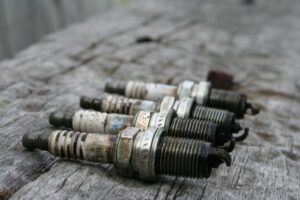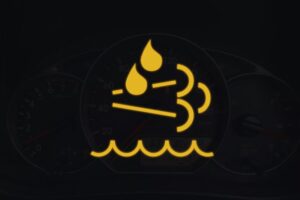Don’t panic if you hear grinding noise when you step on the brakes. You need to know why this is happening to fix it. What causes a grinding noise when braking and how to fix this issue?
If you hear sharp grinding noise when you step on the brakes, it could be that the brake disc and the caliper are rubbing against each other. You can fix this problem by replacing the brake pads immediately. You may also need to have the rotors or discs replaced.
When you have worn-out brake pads, your car’s exposed metal parts will grind against the rotor each time you step on the brakes. If you continue driving your car with this grinding noise, you can damage the brakes’ rotors and calipers.
Read on to learn more about the grinding noise produced by your car every time you brake, what causes it, how to fix it, and how to prevent it.
Grinding Noise When Braking
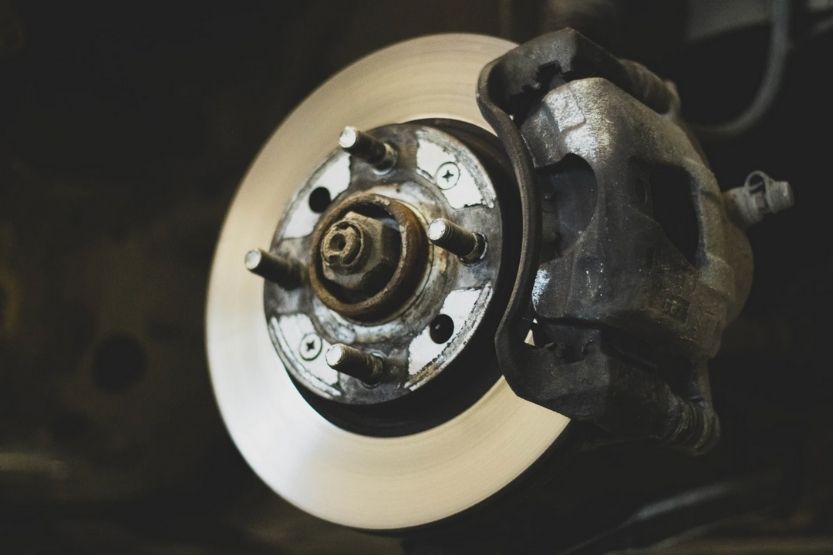
If your car makes noise when braking, the brake disc and the caliper may be touching each other. Usually, when you step on the brakes, the brake pads will squeeze the rotor so the car will stop.
But when the brake pads are excessively worn out, exposure of some of its metal parts happens. These exposed metal parts will rub against the rotors each time you step on your brake. In this situation, there is metal-to-metal contact when you step on the brakes, producing the grinding noise.
If you continue driving with the noise in the background, you will likely damage the brake rotors and the calipers. You can fix this problem by replacing the bad brake pads immediately. While fixing this issue, you may also need to have the rotors or discs replaced.
You should not drive your car too long once you start hearing this grinding noise. While you may still apply the brakes, you will cause more damage to the rotors and the calipers. This may result in more expensive repairs. So, you have to tow your car to a car service center right away to have the necessary brake system repaired.
How Brakes Cause Grinding Noises
The car parts that can produce a grinding noise are the drum brake shoes and the disc brake pads. They have full brake linings or brake friction materials when they are new. But as you use them over time, these linings get thinner and thinner.
If the brake pads are not replaced quickly, the brake linings will get so thin that some of the metal parts will be exposed. The metal brake pad will rub against the steel brake rotor when that time comes.
Metal-to-metal contact will occur each time you apply the brakes. That produces the grinding noise. The noise is usually deafening. Generally, the noise comes from the front or rear brakes. It is seldom that both front and rear brakes create this noise.
Why Is My Car Creaking at Low Speeds?
9 Possible Causes and Fixes of a Grinding Noise When Braking
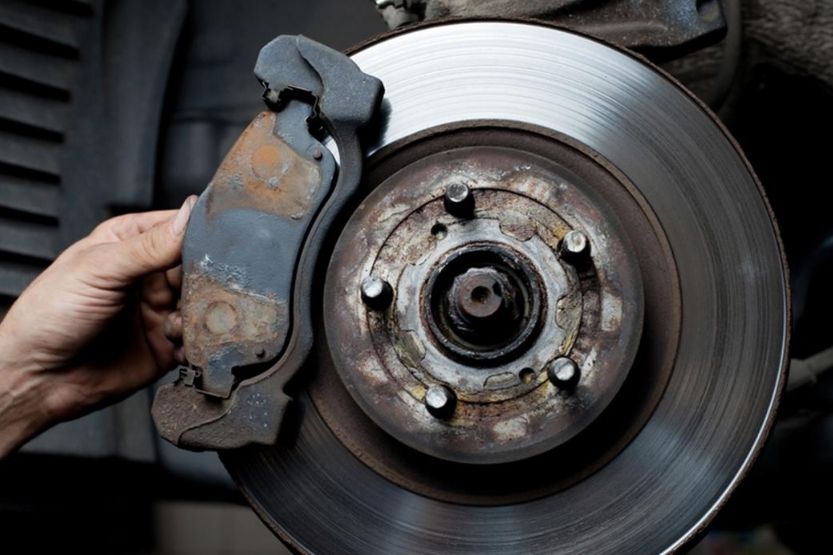
If the grinding noise persists and does not go away every time you step on the brakes, something causes it. It may worsen if you do not determine what causes this problem. Below are nine possible causes for this grinding noise when braking:
1. Bad Brake Pads
Worn-out brake pads are the most common cause of this grinding noise. The brake pads on the backing plate get thinner as they are used over time. There will be portions of the backing plate that has no more pad in due time. Metal to metal contact will now occur.
It can be the metal of the backing plate rubbing against the metal of the rotor or the rotor metal rubbing against the brake caliper. Either way, grinding noise is produced because metal is rubbing against metal. You need to replace the bad part as soon as possible to minimize the damage.
So, what if you hear a grinding noise when braking, but the pads are fine? If there is a grinding noise, but the brake pads are fine, it could be solid objects between the caliper and rotor, damaged shims, lack of lubrication, bad wheel bearings, or worn-out rotor discs.
2. Solid Objects Between Caliper and Rotor
If you drive your car frequently, you can’t avoid dirt from getting into the car parts, especially under the chassis. There are times when solid objects such as small stones from the pavement can lodge between the brake rotor and the caliper.
When such things happen, you’ll hear grinding sounds as you step on your car’s brakes. The hard objects will damage the rotor and the caliper if they are not removed immediately. They will scrape the friction material and cause uneven wear of the brake pads.
If they are not removed, the rotor will be damaged and may need to be resurfaced or, worse, replaced. The brake pads can also go out of alignment and may reduce your car’s braking performance.
3. Not Driving Your Car Often
In a normal driving scenario, the typical life of a brake pad ranges from 30,000 to 70,000 miles. If you notice grinding noises sooner, it could be that you are not driving your car too often. Rotors don’t get their needed ‘exercise’ when you don’t drive your car enough.
Rust can form on these rotors. They may also get corroded when they are just in the garage, especially during winter. Other parts of the braking system are prone to developing rusts, like the calipers. They can get stuck.
The rotors won’t have smooth surfaces anymore with rusts on their metal surfaces. So, once you start driving and have to step on the brakes, you will hear a grinding noise. The best way to avoid it is not to let your car sit idly in the garage for far too long. Drive it once in a while to prevent this grinding noise problem.
4. Cheap Brake Pads
If you use low-quality brake pads, they will cost you more in the long run. Cheap brake pads usually contain tiny metal chunks. These tiny pieces of metal will rub against the surface of the rotor and scrape it. They may cause heavy damage to your brake system. Only use quality brake pads when replacing worn pads.
5. Damaged Shims
If the shims are damaged, they will also produce grinding sounds in your car. Metal is usually exposed when a shim is worn out. Once this metal rubs against a metal part of the rotor, it will create a grinding sound.
If you are doing brake repairs, you should also have the shims replaced. Some mechanics want to finish the job quickly and forget all about the shims. Ensure that they replace the shims every time you have the brakes fixed.
6. Lack of Lubrication
Sometimes the grinding noise can be caused by the insufficient lubrication of the brake pads. Their backsides should be lubricated slightly with a brake caliper lube whenever new brake pads are installed.
If this is not done, the metal part of the brake pads and the caliper piston will contact each other whenever you step on the brakes. This will result in a rubbing or grinding sound.
7. Caliper Bolts (Pins) Not Lubricated
Additionally, you should also lubricate the caliper slider pins or bolts before they are re-installed. These are the pins or bolts that connect the two sides of the brake caliper. If they are not lubricated, their slides will produce grinding sounds. Reputable car service centers will lubricate these pins after a brake repair job. Some even provide new bolts to their clients.
8. Rotor Discs Are Worn Out
Rotor discs that are already too old can also create grinding noises. Worn-out rotor discs are no longer flat. They will create scraping sounds aside from causing vibrations from the car’s brake system.
Old rotors become warped, cracked, or gouged. Some mechanics try to resurface them if they are only slightly warped. However, if they are already past their usable service lives, you should replace them.
9. Bad Wheel Bearings
A bad wheel bearing is the least likely reason for the grinding noise in your car. If you suspect that it is in the wheels that this annoying noise is coming from, faulty wheel bearings are probably the reason. Aside from the noise, you may also feel the steering wheel vibrating while driving.
So those were nine possible causes of the grinding, scraping, clunking, and clicking noises that can come from your car. Often, it is a grinding noise, but the noise could be scraping, clunking, or clicking.
Importance of Quickly Fixing the Issue of the Grinding Brake Noise
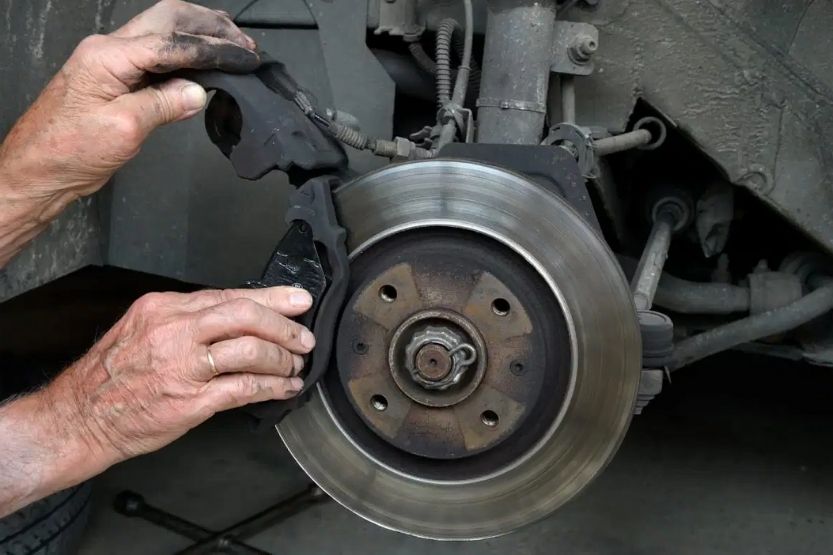
You need to distinguish the many noises your car produces while running. The quicker you can gauge the problem, the faster you can prevent the problem from getting worse.
Serves as a Warning for Other Problems
You should consider strange noises while braking as a warning that one of the most critical parts of your car is having some problems. Don’t ignore the noise, especially if it comes right after you step on the brakes.
Brake grinding is an issue that you need to address promptly. Automotive brakes perform a tough job. You expose them to tremendous forces, and they generate too much heat every time you activate your car’s braking system.
The excessive friction developed by stopping a speeding vehicle is enough to cause the brakes to become red hot. So, you will understand why over time, they wear out, malfunction, and finally expire.
At the first sign of a brake problem, such as grinding noise, have your braking system checked by a qualified auto mechanic. Doing so will help you avoid costly repairs and save your life.
CPR (Caliper, Pads, and Rotors)
Auto mechanics say that grinding noises are small voices whispering in your ears, saying, “you are killing me.” They created an acronym for this car problem: CPR, which stands for calipers, pads, and rotors.
When you take your car for this repair and perform the required fix, the car repair shop will give you the bill afterward. That’s when you will have to get real CPR or cardiopulmonary resuscitation.
Once you hear this grinding noise, stop your car on the roadside. Then call for a tow truck. Don’t worry about the cost of the tow. You need to think about the further damage your car can sustain if your car makes this noise when braking.
So, don’t think you can still drive your car safely once this grinding noise hits. The longest distance you can drive once you hear a grinding noise in your car’s braking system is the distance from the road to the shoulder of the road.
Cost of Replacing Brakes Pads, and Rotors
In general, a brake repair job that involves brake pad replacement, new caliper, and new rotor, including labor, ranges from $300 to $800. The actual cost will depend on the make and model of your car and the necessary fix.
If all these parts are replaced, the cost will increase to $1000 plus. The average cost of this kind of auto brake system repair is $500. Repair costs also vary depending on the quality of the braking system parts.
If you are lucky, a mechanic will only change the brake pads, and the grinding noise will disappear. You will be able to use the rotors still. But if you insist on driving your car with this noise in the background, the time will come that you may also need to replace the rotors. They are more expensive than the pads.
Conclusion: Grinding Noise When Braking
If you step on the brakes and instantly hear a grinding noise, the brake disc is likely rubbing against the caliper. You can fix this problem by replacing the brake pads right away. But as you perform this repair, you may also need to replace the rotors or discs.
Brake pads that are excessively worn out will have exposed metal parts. These exposed metal parts of the brake pads will rub against the brake rotors every time you step on the brakes. You will likely damage the brake rotors and calipers if you continue driving your car with this grinding noise in the background.
What if you hear grinding noise when braking, but the pads are fine? If you hear a grinding noise but the brake pads are fine, it could be solid objects between the caliper and rotor, damaged shims, bad wheel bearings, lack of lubrication, or worn-out rotor discs.
Related reading:
Brake Pedal Goes to Floor When Engine Running [How to Fix]
Brake Lights Won’t Turn Off [Causes and How to Fix]
Electric Parking Brake [What Is It and How Does It Work?]
How to Fix a Car Window That Won’t Stay Up
Gravity Bleed Brakes [Explained and How to Gravity Bleed Brakes Alone?]
Why Does My Car Make a Loud Humming Sound When I Accelerate?

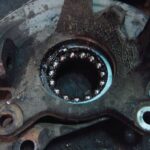
![Noise When Braking at Low Speed [Causes and How To Fix] noise when braking at low speed](https://roadsumo.com/wp-content/uploads/2021/07/noise-when-braking-at-low-speed-150x150.jpg)


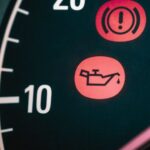
![Clicking Noise When Turning [Causes and How to Fix] clicking noise when turning](https://roadsumo.com/wp-content/uploads/2022/12/clicking-noise-when-turning-150x150.jpg)
![Read more about the article Car AC Stopped Working Suddenly [Not Blowing Cold Air]](https://roadsumo.com/wp-content/uploads/2021/01/car-ac-stopped-blowing-cold-air-all-of-a-sudden-300x200.jpg)
